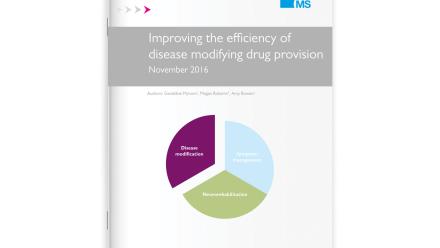Compare disease modifying drugs (DMDs)
Compare the different types of disease modifying drugs (DMDs) that are available to treat multiple sclerosis (MS).
2 minute read
Our report Improving the Efficiency of DMD Provision (PDF, 420KB) outlines how DMD management and monitoring can be improved and modernised, and makes a number of recommendations.


We looked at how teams could manage and monitor an increasing number of people with MS on disease modifying drugs safely and efficiently. Our report highlights the ways DMD management and monitoring can be streamlined.
The report recommends that, for efficient practice, not everything should be done by MS specialist nurses. There is a role for DMD/Therapies nurses, DMD coordinators (or combined MS and DMD coordinators in smaller teams), and an increased role for pharmacists and pharmacy technicians.
The Poole Hospitals service has developed a model job description for an MS and DMD coordinator (DOC, 108KB) based on an original used in Cardiff.
Our practical resources on capacity planning and business cases provide tips on making the case for new staff.
The report recommends that DMD services should have:
The report highlights that in many cases, people with MS on DMDs are having a specialist consultation every time their bloods are monitored. Some of these reviews are important, but some may be wasteful and reduce the availability of specialist input for people who are not on DMDs.
The report recommends involving people with MS in understanding their own DMD treatment and monitoring through: